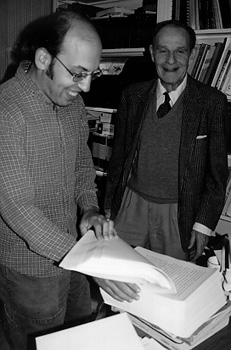
 |
Freethought & Rationalism ArchiveThe archives are read only. |
|
|||||||
|
|
Thread Tools | Search this Thread |
|
|
#1 |
|
Regular Member
Join Date: Aug 2005
Location: New York State
Posts: 440
|
I found this pretty interesting. He suggests that humans have a universal fascination with and respect for anything antiquarian, and that in most cultures recieved wisdom is held sacrosanct; modern post-Enlightenment historical scholarship is in fact a way to harness this reverence to arrive at new information:
http://sbl-site.org/Article.aspx?ArticleId=659 |
|
|
|
|
#2 | ||
|
Senior Member
Join Date: Mar 2007
Location: Texas
Posts: 976
|
Quote:
 MANUSCRIPT--Prof. William Propp flips trough his 1,000 page commentary on Exodus--the first volume project, with his editor, Prof. David Noel Freedman. Quote:
http://www.jewishsightseeing.com/usa...opp_exodus.htm This would be yet another example of why some linke the Jews with the "Protocols of Zion". A recent movie that came out actually linked the Protocols with 911. Professor Propp's commentary doesn't help dissuade... DVD-Protocols The consistency of Jewish scholars bashing their own Bible is far to frequent to ignore, makes them exceptional and therefore ignorable. Thanks for the heads-up on Propp. Basically, the Jewish "illuminati" slant on Biblical commentary is that it is not taken seriously, seen only as Christian-bashing in disguise. This is a classic example of high-end disinformation, a sure trade mark of the Mysteries and the so-called "Iluminati". His dating the Exodus in the 15th century BCE rather than in the 1st of Akhenaten is a dead giveaway. Doesn't it bother you that Manetho gives us the very year of Joseph's appointment as Vizier in the 17th of Apophis, which would point right to the 1st of Akhenaten as the king beginning his rule at the time of the Exodus, his obvious influence by the Ten Plagues resulting in his becoming a monotheist, and yet it's not one of the "options" being discussed. We have 15th century Exodus and 13th century during the time of Rameses II, which are unstanable, but why such a historical boycot of Akhenaten with a direct, extra-Biblical reference exists? Furthermore, if Propp were so thorough, he'd know from his own Jewish history by comparing apocryphal "Esdras" with canonical Esdras (Ezra, Nehemiah) that there are serious chronology issues as Nehemiah is clearly placed before Esther, who is married to Artaxexes, the "son of Xerxes." You can't just ignore all that and claim to be both educated, a New and a prophessor of Biblical Studies. Give me a break! I used to live in Los Angeles and have done research at the University of San Diego. I would have loved to have seen him in person and shared a few of my "insights" with him, which checking his office out for any cultic goddess artifacts. Thanks for this reference. Appreciated. But not to worry. LG47 |
||
|
|
|
|
#3 | |||
|
Contributor
Join Date: Mar 2006
Location: Falls Creek, Oz.
Posts: 11,192
|
Quote:
For example ... Bryn Mawr Classical Review 01.02.15 Quote:
In the original article above, the author makes this interesting comments here ... Quote:
article covers agreat deal of ground for an archeologist. You may find that the issues covered in this article above are further explored to a very detailed depth in Arnaldo Momigliano. Interestingly, like the famous academic of antiquity, Porphyry, Momigliano was unfortunate to have been born in the time of the rise of a malevolent despot. Momigliano was fortunate enough to fall back to Oxford, whereas the fate of Porphyry is entirely unknown to the planet, with the possible exception that the words of Constantine betray a hidden knowledge, as to the ultimate fate of Porphyry ... "Porphyry found the reward which befitted him". Best wishes. |
|||
|
|
|
|
#4 | ||
|
Senior Member
Join Date: Mar 2007
Location: Texas
Posts: 976
|
Quote:
LG47 |
||
|
|
|
|
#5 |
|
Contributor
Join Date: Mar 2002
Location: nowhere
Posts: 15,747
|
Do we ever get tired of ancient conspiracies? Flavians, Pisonians, Constantinians, and now Persians.
|
|
|
|
|
#6 | |
|
Contributor
Join Date: Mar 2006
Location: Falls Creek, Oz.
Posts: 11,192
|
Quote:
what was this rebellion all about? |
|
|
|
|
|
#7 | |
|
Banned
Join Date: Apr 2005
Location: Queens, NY
Posts: 2,293
|
Quote:
Shalom, Steven |
|
|
|
|
|
#8 | |
|
Contributor
Join Date: Mar 2006
Location: Falls Creek, Oz.
Posts: 11,192
|
Quote:
concerning "conspiracy theories", and I have commented on both your positions in a separate thread entitled: Constantine's Bible: "conspiracy theories" vs "absolute political power" |
|
|
|
|
|
#9 | |
|
Contributor
Join Date: Mar 2006
Location: Falls Creek, Oz.
Posts: 11,192
|
Quote:
Unless we know our history, |
|
|
|
| Thread Tools | Search this Thread |
|